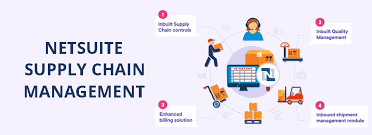
Streamline Your Supply Chain with NetSuite SCM: Maximizing Efficiency and Visibility in NetSuite ERP
Welcome to supply chain management, where chaos reigns supreme and visibility is a faraway dream. Don’t you hate it when you don’t know where your inventory is or when your suppliers decide to play hide and seek? But don’t worry, NetSuite SCM is here to save the day! Its amazing efficiency and visibility powers will transform the way you run your supply chain. So strap in, my buddy, as we begin on a trip to optimize your supply chain and maximize your NetSuite ERP success. Let’s get started!
Understanding the Supply Chain
The supply chain! A secret network of interrelated procedures that assures items appear magically before our very eyes. Well, not exactly miraculously, but you get the concept. So, what is a supply chain? It’s similar to a dance performance, where different partners join hands to create a synchronized routine. It is the path of a product from its conception to the hands of the end consumer in supply chain jargon. Think about raw materials, manufacturers, distributors, retailers, and everyone in between. Now, let’s look at the essential elements of this intriguing dance. The first is procurement, which is where businesses source raw materials. The materials are then converted into finished goods throughout the manufacturing process. Following that, the items are distributed to various locations. Finally, there is retail, where buyers can buy these items. Each step, like a well-rehearsed ballet performance, is critical to ensure a seamless flow of commodities. But, wait! Don’t be taken in by its opulence. The supply chain faces numerous obstacles. Keep an eye out for updates!
Challenges in Supply Chain Management
Supply chain management is a vital part of modern business, ensuring the effective movement of goods and services from raw material suppliers to end users. This complicated process, however, is not without its difficulties. First and foremost, global supply networks face the danger of disruption due to natural disasters, political instability, or unanticipated events such as the Covid-19 outbreak, emphasizing the significance of developing resilience.
Another important difficulty is the increasing complexity and globalization of supply chains, which leads to longer lead times and communication challenges among numerous stakeholders. Inventory management and demand forecasting can also be difficult, as faulty estimates can result in stock outs or surplus inventory, affecting profitability.
Furthermore, with increased consumer demands for transparency and eco-friendly efforts, maintaining ethical and sustainable practices throughout the supply chain remains a continuous problem. Businesses must embrace innovative technologies, develop collaboration among supply chain partners, and continuously modify their strategy to an ever-changing global landscape to successfully address these problems.

Optimizing Supply Chain with NetSuite ERP
In today’s fast-paced global marketplace, effective supply chain management is critical for firms to stay competitive. NetSuite ERP (Enterprise Resource Planning) provides a comprehensive solution for streamlining and optimizing supply chain operations, giving businesses an advantage.
One of NetSuite ERP’s primary capabilities is real-time visibility across the whole supply chain. Businesses can receive a comprehensive perspective of their supply chain activities by integrating processes such as procurement, inventory management, production, and distribution. This insight allows for timely decision-making, shorter lead times, and less excess inventory, all of which result in cost savings and better customer service.
NetSuite ERP’s demand forecasting features aid in supply chain optimisation. Businesses may create better predictions about client demand by analyzing historical data and market patterns. This, in turn, helps them optimize inventory levels, preventing stock outs or overstock situations.
Additionally, NetSuite ERP enables seamless communication with suppliers and partners. Through the platform’s cloud-based accessibility, stakeholders can communicate real-time information, coordinate shipments, and address possible concerns quickly, encouraging improved communication and stronger connections throughout the supply chain.
Furthermore, the system’s automation features decrease manual errors and improve procedures like order processing and billing. This efficiency not only saves time, but also increases accuracy and lowers operational expenses.
Key Features of NetSuite SCM
NetSuite Supply Chain Management (SCM) is a sophisticated cloud-based solution that improves operational efficiency and helps organizations stay competitive in today’s fast-paced industry. Its major characteristics enable businesses to optimize their supply chain procedures and improve overall performance.
Real-time Visibility: NetSuite SCM offers real-time insights into inventory, orders, and shipments, enabling businesses to make informed decisions and respond swiftly to market demands.
Demand Planning: Advanced demand forecasting tools aid in accurately predicting future demand, reducing stock outs, and ensuring optimal inventory levels.
Order Fulfillment: Automate order processing and fulfillment, reducing order-to-cash cycles and improving customer satisfaction.
Procurement Management: Effectively manage suppliers, track purchase orders, and negotiate better terms to optimize procurement processes.
Warehouse Management: Efficiently manage warehouse operations, pick, pack, and ship products with precision, improving overall productivity.
Multi-channel Sales: Seamlessly integrate sales channels, providing customers with a unified and consistent buying experience.
Global Inventory Control: Centrally manage inventory across multiple locations, optimizing stock levels and reducing holding costs.
NetSuite SCM provides businesses with a comprehensive set of tools to help them optimize their supply chain, increase efficiency, and achieve long-term success.
Real-time Analytics and Reporting
Analytics and reporting in real time Making data-driven judgements is critical in the fast-paced world of supply chain management. NetSuite SCM provides real-time visibility into supply chain performance, allowing you to make smart decisions based on reliable data. No more speculating on which parts of your supply chain are producing bottlenecks or delays. NetSuite’s powerful analytics and reporting features provide you complete visibility into your supply chain, from inventory management to order fulfillment. Key performance indicators (KPIs) can be easily tracked and monitored to identify areas that need improvement or optimization. The days of sifting through multiple spreadsheets or relying on out-of-date reports are over. NetSuite SCM centralizes all of your supply chain data on a single platform, making it easier to access and analyze. You may create real-time reports and dashboards that deliver actionable insights, allowing you to discover bottlenecks and quickly resolve issues. Consider having the ability to make informed decisions that improve the efficiency of your supply chain. You can do just that using NetSuite SCM. Accept data-driven decision making, gain visibility into supply chain performance, and easily eliminate bottlenecks. Say goodbye to manual guesswork and hello to a streamlined, efficient supply chain.
The Future of Supply Chain Management
Supply chain management is undergoing a change in a business environment that is always changing due to technological improvements and shifting consumer expectations. Supply chain management will become more effective, agile, and sustainable in the future.
Automation and AI: In order to improve supply chain operations, automation and artificial intelligence will be essential. These technologies will streamline operations and lower human mistake rates, from autonomous delivery vehicles to demand forecasts powered by AI.
Blockchain Integration: Transparency and traceability in the supply chain will be revolutionized by blockchain technology. It will improve product authenticity.
